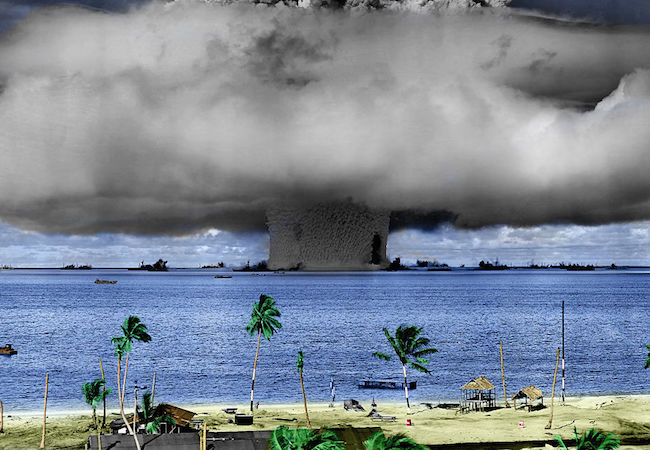
By Yasir Hussain
Marshall Islands is fighting a case in the International Court for Justice for global nuclear disarmament. It seems that instead of the U.S., it has dragged the wrong parties to ICJ. Marshall Islands is a tiny Pacific Ocean situated between Hawaii and Guam that had witnessed a nuclear holocaust in past as a result of sixty-seven nuclear weapons tests conducted by the U.S. The lawyers representing the Pacific island are barking up the wrong tree while trying to convince ICJ that India, Pakistan and Britain have not failed to disarm and halt the nuclear arms race. The actual offender is out of cross hair because Marshall Islands enjoys excellent bilateral relations with the U.S. and also because ICJ has no jurisdiction over the latter.
On 7 March 2016, lawyers representing the Marshall Islands began legal proceedings at the ICJ against India, Pakistan, and Britain. Earlier in April 2014, Marshall Islands filed lawsuits against all nine nuclear weapon States at ICJ. Simultaneously, a suit was also filed against the U.S. in an American Federal District Court. However, the American court understandably dismissed the suit.
The rendition of Marshall Islands lawyers – some of them happen to be American – is indeed heart rending. Between 1946 and 1958, the U.S. had used Marshall Islands as testing lab for 67 nuclear tests that included bombs even of 15 megaton destructive range, hundreds of times powerful than the two bombs America had dropped on Hiroshima and Nagasaki in 1945. One such bomb was called Castle Bravo, which was tested on March 1, 1954 at Bikini Atoll literally contaminated the entire island. The massive tests led to critical radiation fallout in the Rongelap, Rongerik, Alinginea and Utirik Atolls, resulting in huge contamination.
As a result, huge number of population was subjected to lethal doses of radiation. However, in early 1970s the U.S. scientists declared Bikini safe for resettlement even some residents were allowed to return but removed back in 1978 due to high levels of radiation from eating foods grown on the former nuclear test site.
Since then, Marshall Islands is fighting a slogging match for nuclear disarmament. Their major focus is the Article VI of the NPT that demands the states parties to the Treaty to pursue disarmament and cessation of the nuclear arms race. Pakistan and India are not party to this discriminatory treaty, but Britain is.
NPT’s nuclear-armed States are bound to work towards nuclear disarmament but some of these are interested only in half-measures such as nuclear non-proliferation to assert their monopoly and expect others to compromise their security interests.
The U.S. would expect others to believe that it is working with Russia in a gradual disarmament process, which is incorrect. According to the U.S. State Department, the United States possessed 4,717 active nuclear warheads as of September 30, 2014, including tactical, strategic, and no deployed weapons. The Stockholm International Peace Research Institute (SIPRI) estimates that Russia has 8000 of nuclear warheads. Under their bilateral arms control treaty, called New START, Russia and the United States have reduced their nuclear stockpile but not completely destroyed the fissile material from those reductions. Even the reduced arsenal still accounts for more than 93% of all operational nuclear warheads. Expecting others to disarm first is dim-witted.
In such circumstances, Marshal Islands’ law suit against India, Pakistan and Britain seems out of place because two out of the accused have taken no disarmament obligation and the third – like other two – has not tested any weapons that could have caused any damage to Marshallese. Interestingly, ICJ does not have the mandate to give any ruling on disarmament. One could sympathize with Marshall Islands case if it had brought the right party to the court. Marshall Island might be the David, but the three States it is up against are not the Goliath.




